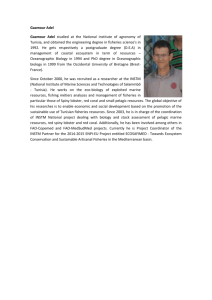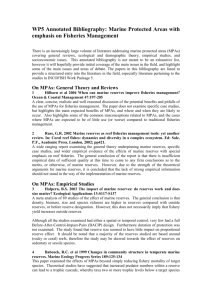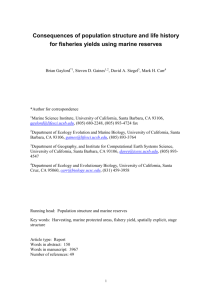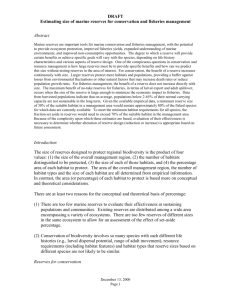Matrix - FIU Global Learning
advertisement
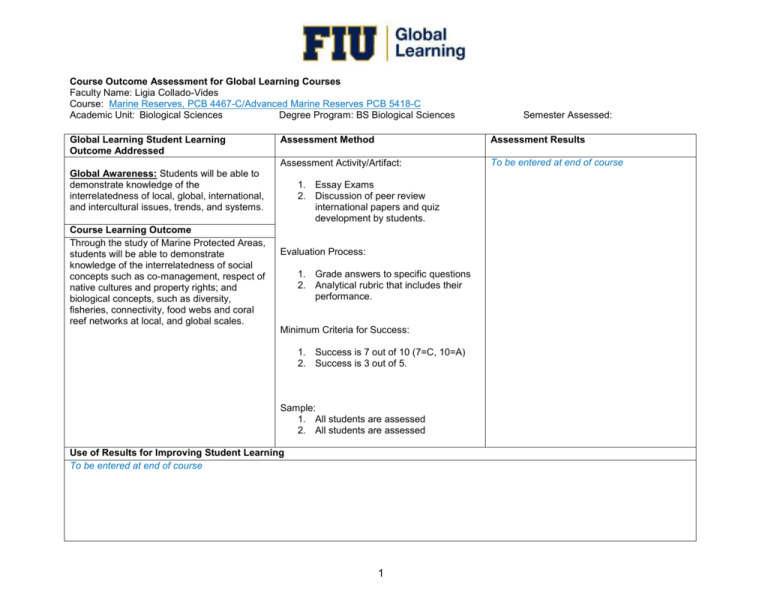
Course Outcome Assessment for Global Learning Courses Faculty Name: Ligia Collado-Vides Course: Marine Reserves, PCB 4467-C/Advanced Marine Reserves PCB 5418-C Academic Unit: Biological Sciences Degree Program: BS Biological Sciences Global Learning Student Learning Outcome Addressed Assessment Method Assessment Results Assessment Activity/Artifact: To be entered at end of course Global Awareness: Students will be able to demonstrate knowledge of the interrelatedness of local, global, international, and intercultural issues, trends, and systems. Course Learning Outcome Through the study of Marine Protected Areas, students will be able to demonstrate knowledge of the interrelatedness of social concepts such as co-management, respect of native cultures and property rights; and biological concepts, such as diversity, fisheries, connectivity, food webs and coral reef networks at local, and global scales. Semester Assessed: 1. Essay Exams 2. Discussion of peer review international papers and quiz development by students. Evaluation Process: 1. Grade answers to specific questions 2. Analytical rubric that includes their performance. Minimum Criteria for Success: 1. Success is 7 out of 10 (7=C, 10=A) 2. Success is 3 out of 5. Sample: 1. All students are assessed 2. All students are assessed Use of Results for Improving Student Learning To be entered at end of course 1 Course Outcome Assessment for Global Learning Courses Faculty Name: Ligia Collado-Vides Course: Marine Reserves, PCB 4467-C/Advanced Marine Reserves PCB 5418-C Academic Unit: Biological Sciences Degree Program: BS Biological Sciences Global Learning Student Learning Outcome Addressed Assessment Method Assessment Results Assessment Activity/Artifact: To be entered at end of course Global Perspective: Students will be able to develop a multi-perspective analysis of local, global, international, and intercultural problems. Course Learning Outcome Students will be able to develop a proposal for a World Heritage site. Each proposal will try to convince the World Heritage that their particular Marine Protected Area is worth the label and protection provided by the World Heritage. Students will be able to 1. Analyze biological value of the site 2. Analyze the cultural value of the site 3. Analyze the social benefit of having a world Heritage site 4. Analyze the human capacity to manage a World Heritage Site. Semester Assessed: 1. Presentation in class 2. Written essay Evaluation Process: 1. Analytical rubric 2. Holistic grade Minimum Criteria for Success: 1. 3 out of 5 2. 7 out of 10 (7=C, 10= A) Sample: 1. All students are assessed 2. All students are assessed Use of Results for Improving Student Learning To be entered at end of course 2 Course Outcome Assessment for Global Learning Courses Faculty Name: Ligia Collado-Vides Course: Marine Reserves, PCB 4467-C/Advanced Marine Reserves PCB 5418-C Academic Unit: Biological Sciences Degree Program: BS Biological Sciences Global Learning Student Learning Assessment Method Outcome Addressed Assessment Activity/Artifact: Global Engagement: Students will be able to Participation in two town hall meeting demonstrate willingness to engage in local, simulations, one at the beginning of the class global, international, and intercultural problem and a second one at the end of semester solving. when students will have the entire course acquired information. In each town hall meeting each student will have to represent a Course Learning Outcome different stakeholder sector (i.e. commercial Students will be able to participate in a town fisheries, recreational fisheries, dive tourists hall meeting to solve real problems faced by guide, restaurant industry, residents, and Marine reserves. Each student will have to represent a different other important sectors) then, discuss and come with solution to real problems faced by stakeholder sector (i.e. commercial fisheries, the Marine Protected Area in place such as recreational fisheries, dive tourists guide, the request of establishing a 5 stars hotel in a restaurant industry, residents, and other turtle nesting area. important sectors) then, discuss and come with solution to real problems faced by the Evaluation Process: Marine Protected Area in place such as the Observation checklist of student’s request of establishing a 5 stars hotel in a performance. turtle nesting area. Students will be able to demonstrate their willingness to engage in Minimum Criteria for Success: local problem solving and interact with Improvement from first to second exercise different cultural sectors. Sample: All students are assessed Use of Results for Improving Student Learning To be entered at end of course 3 Semester Assessed: Assessment Results To be entered at end of course







